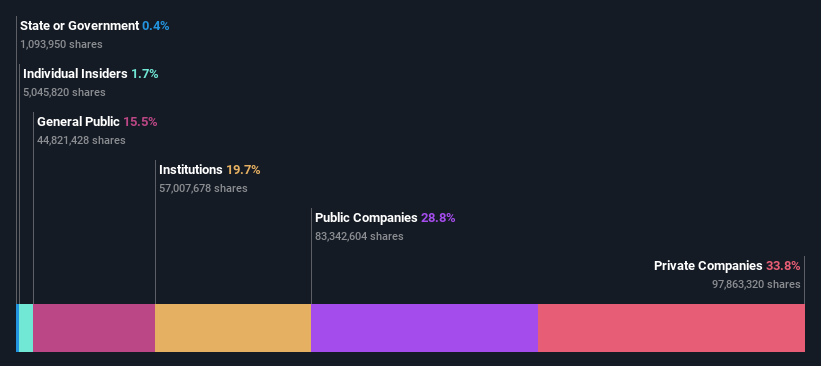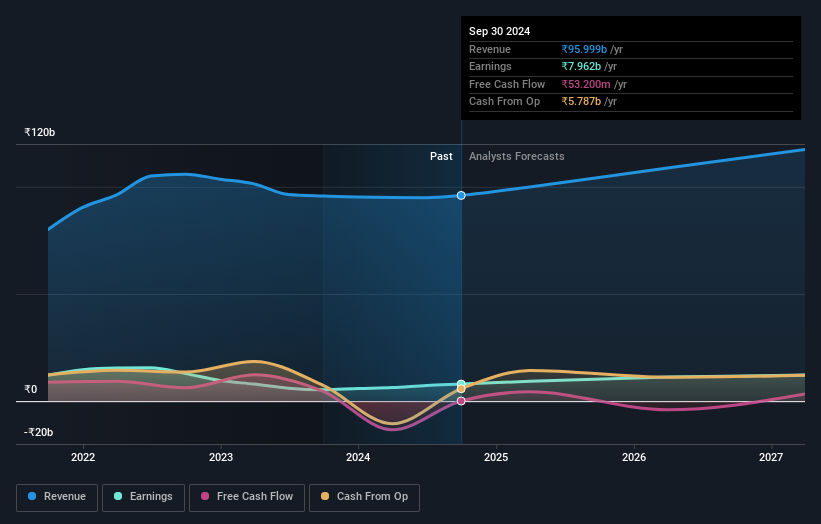Vardhman Textiles Limited's (NSE:VTL) stock price dropped 3.2% last week; private companies would not be happy
Key Insights
- Vardhman Textiles' significant private companies ownership suggests that the key decisions are influenced by shareholders from the larger public
- The top 3 shareholders own 58% of the company
- Institutions own 20% of Vardhman Textiles
If you want to know who really controls Vardhman Textiles Limited (NSE:VTL), then you'll have to look at the makeup of its share registry. The group holding the most number of shares in the company, around 34% to be precise, is private companies. In other words, the group stands to gain the most (or lose the most) from their investment into the company.
And last week, private companies endured the biggest losses as the stock fell by 3.2%.
Let's take a closer look to see what the different types of shareholders can tell us about Vardhman Textiles.
See our latest analysis for Vardhman Textiles

What Does The Institutional Ownership Tell Us About Vardhman Textiles?
Institutional investors commonly compare their own returns to the returns of a commonly followed index. So they generally do consider buying larger companies that are included in the relevant benchmark index.
We can see that Vardhman Textiles does have institutional investors; and they hold a good portion of the company's stock. This suggests some credibility amongst professional investors. But we can't rely on that fact alone since institutions make bad investments sometimes, just like everyone does. It is not uncommon to see a big share price drop if two large institutional investors try to sell out of a stock at the same time. So it is worth checking the past earnings trajectory of Vardhman Textiles, (below). Of course, keep in mind that there are other factors to consider, too.

Hedge funds don't have many shares in Vardhman Textiles. Our data shows that Vardhman Holdings Limited is the largest shareholder with 29% of shares outstanding. With 18% and 11% of the shares outstanding respectively, Adishwar Enterprises LLP and Devakar Investment and Trading Company Private Limited are the second and third largest shareholders. Furthermore, CEO Shri Oswal is the owner of 1.0% of the company's shares.
After doing some more digging, we found that the top 3 shareholders collectively control more than half of the company's shares, implying that they have considerable power to influence the company's decisions.
Researching institutional ownership is a good way to gauge and filter a stock's expected performance. The same can be achieved by studying analyst sentiments. There are plenty of analysts covering the stock, so it might be worth seeing what they are forecasting, too.
Insider Ownership Of Vardhman Textiles
The definition of an insider can differ slightly between different countries, but members of the board of directors always count. Company management run the business, but the CEO will answer to the board, even if he or she is a member of it.
I generally consider insider ownership to be a good thing. However, on some occasions it makes it more difficult for other shareholders to hold the board accountable for decisions.
We can see that insiders own shares in Vardhman Textiles Limited. The insiders have a meaningful stake worth ₹2.3b. Most would see this as a real positive. Most would say this shows alignment of interests between shareholders and the board. Still, it might be worth checking if those insiders have been selling.
General Public Ownership
With a 15% ownership, the general public, mostly comprising of individual investors, have some degree of sway over Vardhman Textiles. While this group can't necessarily call the shots, it can certainly have a real influence on how the company is run.
Private Company Ownership
Our data indicates that Private Companies hold 34%, of the company's shares. It might be worth looking deeper into this. If related parties, such as insiders, have an interest in one of these private companies, that should be disclosed in the annual report. Private companies may also have a strategic interest in the company.
Public Company Ownership
Public companies currently own 29% of Vardhman Textiles stock. This may be a strategic interest and the two companies may have related business interests. It could be that they have de-merged. This holding is probably worth investigating further.
Next Steps:
While it is well worth considering the different groups that own a company, there are other factors that are even more important. Case in point: We've spotted 1 warning sign for Vardhman Textiles you should be aware of.
But ultimately it is the future, not the past, that will determine how well the owners of this business will do. Therefore we think it advisable to take a look at this free report showing whether analysts are predicting a brighter future.
NB: Figures in this article are calculated using data from the last twelve months, which refer to the 12-month period ending on the last date of the month the financial statement is dated. This may not be consistent with full year annual report figures.
New: Manage All Your Stock Portfolios in One Place
We've created the ultimate portfolio companion for stock investors, and it's free.
• Connect an unlimited number of Portfolios and see your total in one currency
• Be alerted to new Warning Signs or Risks via email or mobile
• Track the Fair Value of your stocks
Have feedback on this article? Concerned about the content? Get in touch with us directly. Alternatively, email editorial-team (at) simplywallst.com.
This article by Simply Wall St is general in nature. We provide commentary based on historical data and analyst forecasts only using an unbiased methodology and our articles are not intended to be financial advice. It does not constitute a recommendation to buy or sell any stock, and does not take account of your objectives, or your financial situation. We aim to bring you long-term focused analysis driven by fundamental data. Note that our analysis may not factor in the latest price-sensitive company announcements or qualitative material. Simply Wall St has no position in any stocks mentioned.
About NSEI:VTL
Vardhman Textiles
Manufactures, purchases, and sells textiles and fibres in India and internationally.
Very undervalued with flawless balance sheet and pays a dividend.
Similar Companies
Market Insights
Community Narratives



